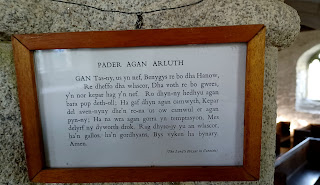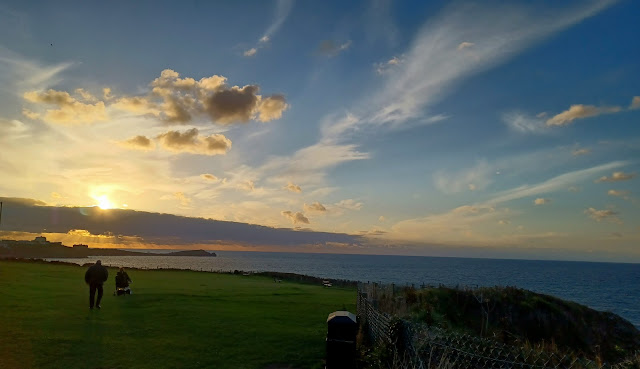First, Look Right...
England is a land of tradition, as you've likely witnessed with the pomp and circumstance that accompanied the Queen's funeral. Lines to simply view the coffin with the Queen lying gently in state jumped up to a nearly 24 hour wait at times, the rope barriers making people snake endlessly back and forth through dark and cold as if in a nightmare wait for a ride at Disneyland. The new King Charles III had gone all out to both honor his mother and to preserve tradition, but also vowed to begin reducing such public outlays starting with his own upcoming coronation, something which would likely occur in the second part of the new year. He, as a dedicated conservationist, also hinted at the downshifting of the future allocation of "royal" monies, not exactly good news for many of the Windsors used to living off taxpayer funds, cousins and cousins-of-cousins who may have a minuscule relation to royal blood from generations ago and whom many of the public here silently consider as being little more than "hanger-ons," a label also often saved for the wife of the former Prince Harry (while both have renounced the Crown it was Harry's wife, Meghan, who was more miffed that neither of them were invited to meet with the world leaders who arrived to pay their respects to the former Queen; Meghan and Harry had earlier asked King Charles to designate their children as prince and princess, which the new King Charles may indeed do albeit without the HRM titles which would have given them taxpayer-funded security and payouts). This is all laid out in the country's charter (Britain does not have a constitution), the proper ascension order and who is or is not a "working" royal deserving of a His Royal Majesty's designation and protection. The LRB's Andrew O'Hagan offered another perspective on some of this... But enough of that. What stood out more to me was the lack of disturbance or incidence within the waiting crowds, there never being a display of impatiece or disruption, as if all are in sych with just giving up a small bit of their lives in order to honor their former Queen, someone the likes of whom they realize they may never see again. It was truly a spectacle, albeit a rather long spectacle, of a country united, soccer hooligans and Royalists alike (her actual burial day was declared a national holiday, what is called a "bank" holiday in the UK). In the small parish of Gunwalloe so many candles were lit for the Queen that the box sat empty (the church is apparently used only occasionally). Inside was a peek at a small bit of Cornish life: the Lord's prayer in Cornish (the language is a bit on its own like Welsh and Gaelic), the small windows to keep out the ocean mist, the stone headstones wearing away after hundreds of years (and no telling how many may be buried beneath those stones since the church buildings alone go back some some 800 years. Said the National Trust: The Church of Winwalloe shelters behind a huge prehistoric cliff castle, and was originally established in the 6th-century by a Breton saint of the same name. The buildings visible today were built in the 13th-century, with a distinct separate bell tower in the cliff itself. The golden sands of Church Cove nestle at its side.* But it was quiet on another front, that of where we were staying near the coast. A puzzling form of what is believed to be an avian flu has been collapsing populations of gulls and gannets, choughs and jackdaws (the virus is believed to have crossed over from the US after affecting commercial chicken farms). As my wife and I hiked over the cliffs, from coastal town to coastal town, it was noticeably silent, the high-pitched call of the gulls gone, the views of the open ocean sometimes blank of the birds that usually arced through the sky. When we finally sat at a pub on the beach and saw a gull brazenly steal a chip (the English term for a French fry) we let out an internal cheer. Odd the things you miss when they're no longer there, even if they seemed irritating at the time. And it wasn't just us as a few locals we talked with expressed their sadness at seeing birds laying dead in the sand or bobbing back and forth like lifeless corks in the water. The coastal service is quick to remove such sights, primarily in an effort to not have the virus spread any further. Cliff and shore birds in this area face several problems in this quest since they tend to cluster together during mating season (the main worry is that the virus will have, or already has, affected the development of egg formation), and that such bird congregations take place in remote or hard-to-access areas. But we were lucky, glimpsing what we hoped would be a return of what ocean snack shops not-so-jokingly call The Cornish Thief. And lest those of us on the other side of the Pond feel complacent, the avian flu has already diminished hopes for a grand Thanskgiving, said the CDC. Supply Chain Dive was a bit more blunt about the situation facing turkey farms in the US: Around 50 million birds were affected in the 2015 outbreak, which the USDA called “the worst documented animal health incident in the United States.” This year’s outbreak is already close to those numbers, with 40.8 million birds affected since the beginning of 2022.
Still, we were here, somehow having successfully shuffled through the maze that is Heathrow and making it down to the bus to Gatwick (itself another maze). Such airports are almost cities unto themselves, with many European airports containing both bus and train stations in their bowels. And in both Heathrow and Gatwick, one had better have their terminals or entrances memorized...get off at Terminal 5 when you're headed to 3, or the North entrance at Gatwick when you meant the South, and you may find yourself in need of a taxi. Walking is the requirement for these international hubs, putting even the 8 and 10-minute walks in my local Salt Lake City airport to shame. People and workers buzzed with activity as if high on coffee and so despite being tired, you had little choice but to join the queue, the first of which is your arrival off the plane. Walk, walk, walk, round a bend, then walk some more. Down a quick escalator and there it was before you, the long snake of a line, one which actually moved rather quickly out of necessity for within a short 4 minutes the next 300 or so passengers from another flight would be descending. No matter, no officials or uniformed people are there to ask who you are or why you are visiting...everything is facial recognition with not a human in site. Slip in your passport, look into the camera, and let the software decide if you should be let in or not (it was the same to even board our flight when we left the US, although there was an agent there to redirect anyone who presented a "problem"). And that was that...we were out on our own (Gatwick scans your boarding pass instead of your passport, but in much the same fashion). Then onward to our baby plane where we walked on the tarmac and climbed up pop-out stairs, and then settled into our baby seats as if resigned for a crash. I couldn't help but think of how much we simply accept as safe, even as I stared at the bent-bladed propellers that would soon hurl us down the runway and perhaps into a mountain in Cornwall, Alaska. But not today, not now, thoughts each of us have, perhaps even the Queen at 96...
Ah, but finally we were here and being driven down a series of hedgerows lit only by our taxi's headlights. But rather than being eerie it was exciting, my feeling of being safely encapsulated and transported just as the past 24 hours had done...from big jet/big bus/big airport to small airplane/small airport and now small taxi. When we eventually climbed the stairs of our creaky-floored hotel, the room and bed looked as luxurious as our tired eyes wanted them to be. We could stop. We could actually stop! We had somehow made it, not only planning and travel-wise, but mentally and physically, body-wise. A quick bite and then blissful sleep...only, most everything was closed. Okay, I'm painting a morbid picture here but anyone who has traveled a full day knows the drill...you're tired but crave a bite and a drink to unwind and to just let the stress dissipate (we did find a place so all ended well). Outside our room we could hear the ocean, we could feel the damp air, we could let our minds bask for a few extra minutes to let it all to sink in. We were here in Cornwall. No dreams this time; we could let the stories continue...
*There are many additional blogs being written on Cornwall and Cornish history. Two blogs which I've found both well-researched and well-photographed were A Cornish Journey and Hesp Food & Travel. Both will give you way more background than a vacationer might want or need, but may provide inspiration if you find yourself trapped inside when the rains and winds prove challenging. You are, after all, in Cornwall...and on an added note, the title to this post refers to the reversal of traffic since British driving is on the left; when crossing a street one of the first things you need to do is to look right, not left...cars come at you from a different side than what you're used to.








Comments
Post a Comment
What do YOU think? Good, bad or indifferent, this blog is happy to hear your thoughts...criticisms, corrections and suggestions always welcome.